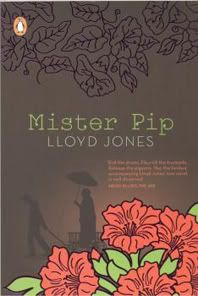A quick dip into 'Mister Pip'
 "Mister Pip" is a haunting New Zealand book by Lloyd Jones that's being pipped (er, sorry) to win the Booker Prize next month. It's a brief but lingering read, a kind of combination of "Dead Poets Society" and "Hotel Rwanda" that pays homage to the mysterious power of storytelling. Set on a remote New Guinea island during a time of violent revolution in the early 1990s, it's the tale of village girl Matilda and the bond she forms with her eccentric schoolteacher, Mr. Watts, the last white man left on the island. With next to nothing in the way of resources, the ragged, exiled Mr. Watts tries to teach the children by reading his way through a copy of Charles Dickens' novel "Great Expectations." But the novel becomes a startling focal point in the battles between the army and the rebels and Matilda's entire world is drawn into the fight. Matilda comes to identify with Dickens' prodigal orphan Pip, despite them coming from two very different worlds.
"Mister Pip" is a haunting New Zealand book by Lloyd Jones that's being pipped (er, sorry) to win the Booker Prize next month. It's a brief but lingering read, a kind of combination of "Dead Poets Society" and "Hotel Rwanda" that pays homage to the mysterious power of storytelling. Set on a remote New Guinea island during a time of violent revolution in the early 1990s, it's the tale of village girl Matilda and the bond she forms with her eccentric schoolteacher, Mr. Watts, the last white man left on the island. With next to nothing in the way of resources, the ragged, exiled Mr. Watts tries to teach the children by reading his way through a copy of Charles Dickens' novel "Great Expectations." But the novel becomes a startling focal point in the battles between the army and the rebels and Matilda's entire world is drawn into the fight. Matilda comes to identify with Dickens' prodigal orphan Pip, despite them coming from two very different worlds. The novel's biggest strength is how it undercuts dreamy reverie with startling bursts of real-life horror. Jones creates some finely drawn characters in his direct, toned prose, and he mostly manages to avoid the cliches inherent in the whole "kindly white gent educates the natives" plot. Jones genuinely probes at the clash between "native" and "white man" culture, and comes to interesting conclusions about it all. He makes Mr. Watts a haunted, flawed figure, particularly in a brilliant final act in the novel in which Matilda goes in search of the truth. Given the choice between a life of war and torture and one of fiction, which would you choose? A fine book and I certainly wouldn't be upset if it took home a big international honor on behalf of Kiwi lit.

No comments:
Post a Comment